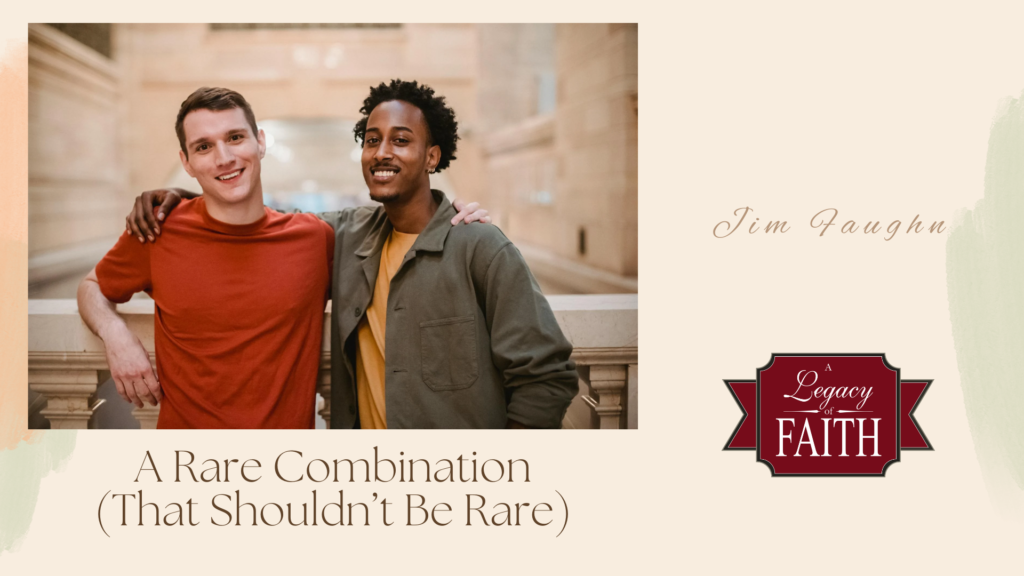A Rare Combination (That Shouldn’t be Rare)
Recently, I was visiting with one of the members of the church where I serve as one of the elders. One of his daughters from another state was taking advantage of a week off from her work to stay with him. Unfortunately, his health is declining to the point that somebody needs to be with him at all times. Since he is a widower, he no longer has a spouse who can help. Fortunately, this daughter and her siblings are seeing to it that this need is met.
During the course of conversation with both the father and the daughter, the daughter said something kind of “out of the blue.” I am relatively certain that I am quoting her exactly when I relate what she said:
“Your congregation has a rare combination of truth and love.”
Of course, I expressed my appreciation to her for her comment. I’m sure that I am not the only person who enjoys hearing a compliment.
I have forgotten some of the conversation that the three of us had that day, but the statement that she made is not among those things that have been forgotten. I keep thinking about the assessment of the church of which I am a member, for which I formerly served as the preacher, and am now serving as an elder.
Shouldn’t every congregation of God’s people be known for both truth and love? If my sister in Christ is correct in her assessment, why would that combination be so rare? Could part of the answer to that be due to the fact that both truth and love are misunderstood by many today?
Sadly, we find ourselves living in a society (a world, in fact) in which many seem to believe that there is no such thing as objective, absolute truth. We may hear of “my truth,” “your truth,” “their truth,” “our truth,” etc. Opinions may grudgingly be accepted, but not truth. All of this is intended to set people free from old fashioned notions, norms, standards, etc.
Neither the passage of time nor changing societal standards should minimize the importance and impact of something that Jesus said about truth and freedom:
If ye continue in my word, then are ye my disciples indeed:
And ye shall know the truth, and the truth shall make you free. (John 8:31-32)
You may also remember that, during His prayer to His Father shortly before He went to the cross, Jesus included this phrase:
…your word is truth. (John 17:17)
If it is true that truth and love compose a rare combination, it could be that the issue may not be a misunderstanding of what truth is. There could be an issue in how the truth is presented.
Absolute truth is absolutely essential. A Christ-like spirit is equally essential.
None of the following words are synonyms of love: “mean,” “obnoxious,” “arrogant,” “condescending.” You may think of similar words that are just as unflattering.
It appears to me that some people need to be reminded that the word of God is called “the sword of the Spirit” in Ephesians 6:17. I have yet to find the passage that speaks of the word of God being referred to as the hammer of the Spirit.
When the gospel was preached in the first century, those who heard it were “pricked in their heart” (Acts 2:47) and/or “cut to the heart” (Acts 5:33; 7:34). Truth was not hammered into the heads of people.
Before you assume that I’ve joined those who do not believe that truth is important, you may want to reread what I’ve already written about the subject of truth. It might help, though, if we would also read, internalize, and apply how the Holy Spirit characterized love in 1 Corinthians 13:3-7. It might give all of us some insight concerning an effective way to present the truth.
When the sister in Christ said what she did in that recent conversation, my first thought was not that this was a nice thing to hear (though it was). My first thought was, instead, about a phrase found in one verse of scripture that needs to be true of all who call ourselves Christians. The phrase should especially be true with regard to those who attempt to lead others to Jesus and/or to help fellow Christians as they seek to deepen their faith.
The phrase is found in a context that makes a definite distinction between what is true and what is not true. The context also deals with spiritual maturity and unity.
That phrase is the reason why I believe that what some may consider to be rare today should, instead, be true of all who represent Jesus:
…speaking the truth in love… (Eph. 4:15)
AUTHOR: Jim Faughn



